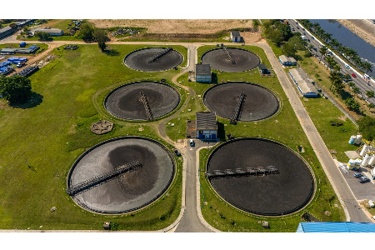Royal HaskoningDHV Wins Major Sewage Treatment Contract For Metropolitan São Paulo

- Advanced wastewater treatment technology crucial to clean up Tietê River
- Project part of Brazil’s €130B investment to transform water quality and services
Royal HaskoningDHV, the international engineering company, has won a contract from Nova ETE Parque Novo Mundo Consortium to provide its Nereda wastewater purification technology for SABESP’s Parque Novo Mundo wastewater treatment plant (WWTP), in São Paulo, Brazil. This project is part of the Integra Tietê project which aims to transform water quality in the Tietê River and its tributaries. The announcement supports the government’s new regulatory framework to ensure universal access to drinking water and wastewater treatment by 2033.
The water treatment industry in Brazil is undergoing a significant transformation. A new regulatory framework for the universalisation of water and sewage services is designed to ensure that 99% of the Brazilian population has access to potable water and 90% to sewage collection and treatment by 2033. Around €130B is being invested in the industry and there has been a partial privatisation of SABESP, the country’s largest water utility.
Better effluent quality
One of the flagship sewage treatment programmes is Integra Tietê, which involves the Parque Novo Mundo, São Miguel, and Barueri WWTPs that serve the 22.8 million population of the Greater Metropolitan area of São Paulo. Its primary goal is to expand the treatment capacity and to improve the quality of the final effluents from the plants and prevent raw sewage from entering the Tietê River. A major challenge is to achieve this without physically expanding the footprint of the existing plants which are in urban areas.
Royal HaskoningDHV’s groundbreaking Nereda aerobic granular sludge technology will accelerate the treatment process and therefore expand the capacity of the Parque Novo Mundo WWTP by 3.5 times. The new plant will take two years to build and be operational in 2027. Royal HaskoningDHV’s customer for this project is the consortium consisting of Passarelli, Consbem, Engeform, and Enfil.
Sustainable technology
“By supplying the Nereda technology for Parque Novo Mundo we will help SABESP increase the treatment capacity of the plant while achieving a better effluent quality. This will be our 17th Nereda plant in Brazil, confirming the excellent fit of the Nereda advantages – small footprint and lowest OPEX – to the water sector in Brazil,” said João Tiago de Almeida, Director of Water Technology at Royal HaskoningDHV. “Nereda is a biological process that co-opts nature to treat wastewater naturally. It can also remove phosphorus from raw sewage without using chemicals. As all the treatment takes place in one tank, it lends itself to operations where space is limited, as in this case of urban wastewater treatment plants. It has a 75% smaller footprint than other plants and consumes 30-50% less electricity.”
Originally co-invented by Professor Mark van Loosdrecht from Delft University of Technology (TU Delft), Nereda is a fully grown technology ideally suited to extend the capacity of Brazilian plants. It also offers options for the future, such as polymer extraction for reuse in other industries. Nereda can be at the heart of a water-based circular economy with reuse of both water and resources in the water, so that wastewater treatment protects human and environmental health and supports a more efficient and sustainable society. With a first application dating back to 2005, today there are more than 120 Nereda plants globally on six continents.
The Nereda technology was born from a public-private partnership between Delft University of Technology, Royal HaskoningDHV, STOWA, and various Dutch water authorities. This partnership of leading water treatment experts was key to developing the technology and advocating the technology globally.
How does it work?
Nereda works by improving the century-old activated sludge process for treating wastewater. That purification process uses natural occurring microorganisms and air to remove organic contaminants and other wastewater pollutants. The microorganisms grow in the form of flocks – called activated sludge, forming a cloudy suspension of cells floating in water – that after the purification are removed from the treated water, slowly settle to the bottom of the tank. The Nereda process uses smartly selected conditions causing the microorganisms to naturally stick together. Instead of forming flocks, they form in granules that settle much faster, at one metre in four minutes, compared to one metre every hour for flocks. This largely reduces the size of the purification equipment needed. Also, the biological processes within a Nereda plant effectively remove eutrophication causing pollutants containing nitrogen and phosphate compounds.
In addition, all the treatment takes place in one tank so there is no need for energy-hungry recycle streams, mixers, pumps, costly membranes and clarifiers. Consequently, Nereda requires less energy and capital investment and has a tiny footprint, up to four times smaller than conventional plants.
Nereda is suitable for greenfield or retrofit projects as in the case of Integra Tietê.
About Royal HaskoningDHV
Royal HaskoningDHV is an independent company dating from 1881 integrating engineering, design, consultancy, software and technology to deliver more added value for clients. Through our mission Enhancing Society Together, we take responsibility for having a positive impact on the world and contribute to UN Sustainable Development Goals. We constantly challenge ourselves and others to develop sustainable solutions to local and global issues related to the built environment and the industry. Backed by the expertise of over 6,500 colleagues working from offices in more than 25 countries across the world, we are helping clients with challenges ranging from climate change and digital transformation to changing customer demands and the energy transition. For more information, visit www.royalhaskoningdhv.com
Source: Royal HaskoningDHV
